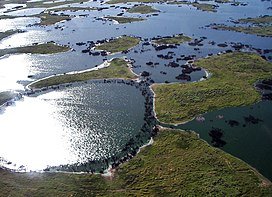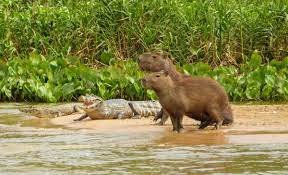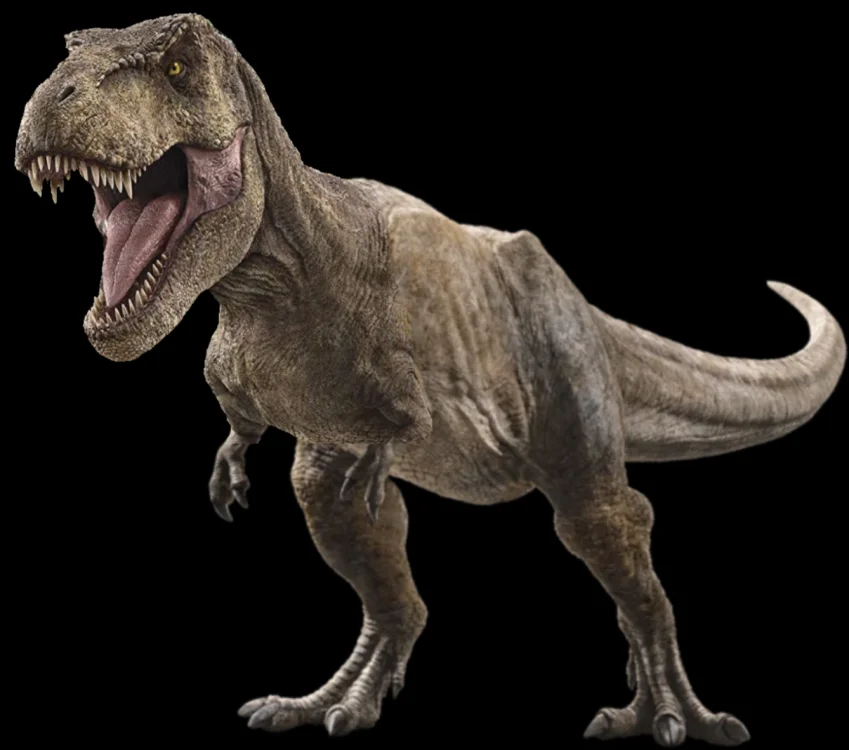-
Posts
916 -
Joined
-
Last visited
-
Days Won
3
Content Type
Profiles
Forums
Events
Everything posted by martillo
-
The previous post didn't answer properly you @swansont pointing out: This observation comes from me saying that one strategy of the T Rex hunting would be staying hiding underwater waiting for preys at the shore and jumping to catch them. I must admit that due to his enormous size this strategy seems to not be possible for him in the wetland environments as I originally thought. Is a strong cornerstone in my proposition and may be this is one of the main reasons that the T Rex isn't considered so aquatic as I was thinking. I will think more about for if there would be another possibility for the T Rex hunting at the shores. This would be essential in my proposition. Ok, I must admit that my proposition seems inviable in several ways. It was just an idea on my head that I needed to resolve...
-
T Rex is known to have lived in North America 68-66 millions years ago. Assuming at that times there was a more tropical clima I think a region like current "Pantanal" in Brasil (https://en.wikipedia.org/wiki/Pantanal) could have been an appropriated habitat for the T Rex. Pantanal is the world's largest tropical wetland area, and the world's largest flooded grasslands. There are big areas deep enough for a T Rex immersed in a water with high quantity of aquatic plants which can help to hide the T Rex from its preys. The region is rich in fauna nowadays. I don't see how it couldn't have been the same way those days. As said at Wikipedia: "Roughly 80% of the Pantanal floodplains are submerged during the rainy seasons, nurturing a biologically diverse collection of aquatic plants and helping to support a dense array of animal species." "The Pantanal ecosystem is home to some 463 species of birds,[5] 269 species of fishes, more than 236 species of mammals,[12] 141 species of reptiles and amphibians, and over 9,000 subspecies of invertebrates." I think even the crocodiles could have been a prey for the T Rex. Typical pantanal scenery:
-
I took a look at your links. I don't doubt that the tail would give better running skills to the T Rex mainly while hunting. The question I would ask is if that big muscular tail couldn't have some shape slightly differently from that of the photo, which appears to be rather cylindrical/conical, being more similar to that of crocodiles and more adapted to give a good help in the T Rex displacement in an aquatic environment. May be some questions lead us to other questions and so on but this is good, isn't it? the aim is to have a good discussion on the subject. May be the T Rex could have a high ability to retain respiration for a long time enough to be totally immerse and even displace under the water if necessary to catch the prey. Crocodiles do that sometimes. This point is being more difficult for me to refute. May be not every wetland is really an appropriated aquatic environment for the T Rex. As you say a considerable deep aquatic environment would be needed. Consider that the T Rex could stay not just standing up but crouched down waiting for the prey, couldn't some aquatic environment between a wetland and a not too deep lake be more appropriated? I will look for some of possible ones at Earth nowadays but it will took sometime for me...
-
Quite there. Take a look at the photo (said to be from Jurassic Park film): Assuming all the body immersed in a deep enough aquatic environment I can see just the top of the head with the nose and the eyes just over the surface. It could look just as a stone in the water to other animals. Crocodiles are also able to see completely immersed in the water. A T Rex could also do that with just the nose outside or retaining respiration for some time.
-
Not sure but I imagined to be hunters like crocodiles but more powerful. Would eat any possible aquatic animal and any other animal arriving at the coast for drinking water.
-
Well, that is the first good argument in the thread. May be would be possible in some environment just similar but a bit more deeper that common wetlands. What about everglades? If I would have done all that investigation I would have published an article on an appropriated journal with my work or presented an academic thesis somewhere and not have posted in this forum as something to discuss, don't you think so? I just had an idea to discuss, isn't it appropriated to discuss it in the forum?
-
The Speculations forum is fine or me on this thread. @swansont asked for some kind of evidence or analysis on the subject: I have provided my analysis in the first post of the thread:
-
I gave my analysis in the OP: Isn't it enough to start a rational discussion? I'm looking for others' point of view on the subject...
-
I just find it less plausible than a wetland lifestyle for the reasons I already posted. Is rather just intuitive for me. The idea to discuss the possibility in this thread is to analyze it with other points of view of other ones with more background in the subject. Misspelling... I should have said: "... I don't use to discuss in the Biology forums (more used to the Physics forums) but I think in some related things sometimes." English is not my natural language. In Spanish to be used is said "acostumbrado". Wrongly transferred to English, I apologize...
-
I don't have evidence. I just find an "amphibious T Rex" much more plausible than a "walking T Rex".
-
I don't have much background in Biology and I'm not costumed to discuss in the Biology forums (more costumed to the Physics forums) but I think in some related things sometimes. I would like to discuss in this thread if the tyrannosaurus could be a species actually well adapted to live in a wetland environment. Seems to me that considering their big size and weight, their proportionally big head and their notably big feet they could not only easily survive in that environment but also have great advantages to hunt preys in the water and on the coast of the wetlands like crocodiles do. Their big size, weigh and head would be not a problem while floating in the water with just their nose and eyes over the surface and their strong legs with big feet and big claws would provide them a high ability to make extraordinary jumps from the underwater ground. Commonly is presented the tyrannosaurus as a big hunter on dry environments like forests but wetlands seems to me a much more appropriated environment for them.
-
Let me simplify what you said: "... every thought we have and every “decision” we make... they’re ALL restricted by the local configuration of the “thinker” and the basic laws of physics and chemistry." Looks the same thing I said in a bit more detailed but a bit more complicated way. I think at the end we agree in the subject.
-
I have found a much better name for the kind of will we were discussing about: "restricted will". I was calling it "conditioned will" but this sounds someway contradictory. "Restricted will" would be much more appropriated. I maintain the definition I gave to it but I would expressed it now just as: "Restricted will" is the possible will the conditions allow. If always conditions are present the possible will is always restricted. So sometimes would be possible to make decisions or choices but only under certain conditions that are always present. There would be no "free will" nor "determinism", just a "restricted will". Much better I think...
-
While you say "there's still more to learn" you are admitting it is still unresolved. How could you be so sure? The conclusion comes from considering that the current model of neural cells even in a complex network cannot completely explain the ability to think. Do you mean that an artificial "neural network" as considered nowadays can really think? I think something is yet hiding to all we know about. The process of thinking seems something still too complex to be completely understood yet. Very meaningful. +1
-
But the dogs perfectly recognize the balloon is not a prey. They are not hunting it just playing with it and each dog has freely decided to play the "game". Is not the case for instance of a dogs' exhibition where the dogs were trained to follow a trainer's directives. The dogs simply and naturally decided to play with a balloon. Isn't this a good example of the kind of "free will" we are talking about? The process of thinking involves this kind of nouns, the abstract nouns, so it would follow that the process of thinking does not obey the laws of Physics. Would that be right for you?
-
May be, just may be, the research on the area could give a more precise difference between AI and human's natural intelligence and that could in principle (not totally sure) help in understanding better the process of thinking in a brain. As I said, actually I'm not sure how the mystery would be solved, is just my guess at the moment.
-
I don't know precisely how the mystery would be solved. May be the current research and development in artificial intelligence (AI) could give a new light on the subject. I mean, current research about if AI could really be equivalent to human's intelligence or not could give a help to solve the mystery.
-
This reasoning is wrong because you are making a considerable mistake. The "free will" we are talking about is about DECISIONS, is about to make CHOICES. Is not about the actions someone make but about the DECISION or the CHOICE to make that action. Any action in the universe obeys all the laws of physics but is the DECISIONS or CHOICES that do not obey any of them. May be there's misunderstanding about "degrees of freedom" here. The universe has a dynamic obeying the laws of physics but is not totally deterministic because its future is not predetermined. Its future does not depend only in its state in the past but also in those DECISIONS or CHOICES that the beings in it with enough developed brains can make at some time on the actions being or to be performed in it. It follows that there are some degrees of freedom in the dynamics of the universe to be able to perform some of the many (may be even infinite) different actions possible at some time. Note that I include as inside the universe all the beings living in it with all their DECISIONS or CHOICES.
-
Well, I took sometime rereading the thread and rethinking about my approach. I think that in refuting the OP approach we all, @iNow, @studiot, @Eise and even @TheVat agree in that some "free will" does exist although some limitation is always present because some conditions are always present prior to any possible event we consider. I'm not really sure why are we discussing so much. Seems we are trying to reach a good agreement in how that kind of "free will" could be defined. My approach was to call it "conditioned will" stating that the called "free will" (as defined in dictionaries) actually would not exist. What I tried to mean is that a total "free will" would not exist and seems we all also agree in that, am I wrong here? Only some "degree of freedom" exist sometimes for us to make decisions. I don't find contradictions in my approach but please feel free to mention if there is any. May be naming it "conditioned will" could lead to some confusion but as for now I cannot think in a better name for it. Is there any? What I don't understand is just about the "compatibilists" approach of both concepts of "free will" and "determinism" being compatible presented by @Eise. For me they both cannot coexist simultaneously. Now, @studiot claimed for a good example of the kind of free will we are all talking about and I posted the video of the dogs playing with a balloon in a beach. For me the dogs at the beach have made a choice with a high degree of freedom in their decision. There's nothing forcing the dogs to play with the balloon, isn't it? They are doing it just because they wanted to do it. I don't understand why @studiot finds it not a good example to treat. As for @Eise question: Everything in the universe obeys the physics' laws but we can intervene in it making changes like sending a space probe to mars so there must be some degree of freedom in the universe's "mechanics" for that be possible. I don't get what you don't understand about this.





